
"Zoom's Auditory Masterclass Fine-Tuning for Impeccable Audio for 2024"

Zoom’s Auditory Masterclass: Fine-Tuning for Impeccable Audio
Best Zoom Audio Settings for Getting Audio Quality in Zoom Meeting

Richard Bennett
Mar 27, 2024• Proven solutions
Are you confused about how to configure Zoom audio settings to get the best sound quality during a meeting? If yes, here you will learn all about Zoom audio, its configuration, and the best way you can use the options to get the best out of your speakers and microphone.
Apart from this, you will also learn some of the best troubleshooting practices if the audio is acting up during an ongoing Zoom conference.
- Part 1: How to Set up Zoom Audio When Before Meeting
- Part 2: How to Set up Zoom Audio During Meeting
- Part 3: Zoom Audio Troubleshooting
How to Set Up Audio in Zoom Meeting?
A broad-spectrum is covered when talking about Zoom meeting audio settings since the meeting audio can be configured in both before/after or during a meeting. Working with Zoom audio settings in both scenarios is discussed below in detail:
Part 1: Zoom Audio Settings When Before Meeting
If you are not already in a Zoom meeting and want to configure sound settings to get the best audio experience, you can follow the process given below:
Note: A Windows 10 computer is used here to set up and configure audio settings in Zoom.
Step 1: Access Zoom Audio Settings Box
Launch Zoom, click the Settings (Gear) icon from the top-right corner and go to the Audio category from the navigation bar in the left of the Settings box that opens up next.
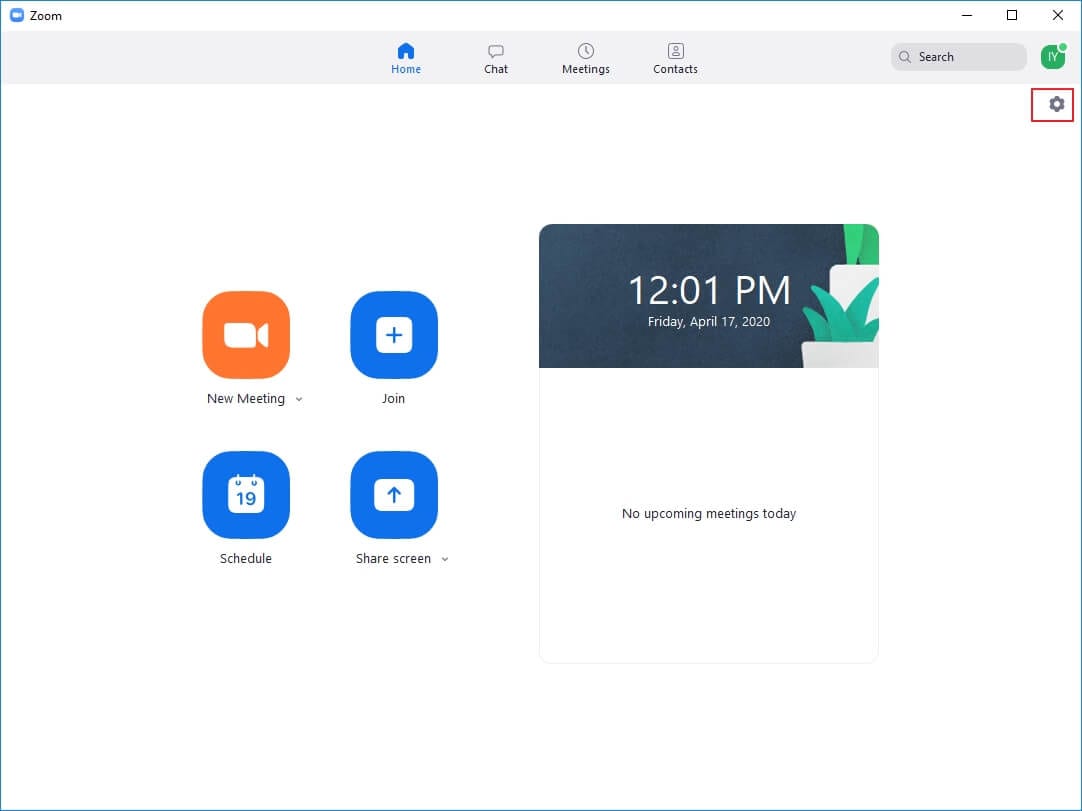
Step 2: Select and Test Output Device
Use the Speaker drop-down list to pick your preferred output device (e.g., speakers, headphone, etc.), and click Test Speaker to listen to the sound that Zoom plays. Use the Volume slider to adjust the output volume at a suitable level.
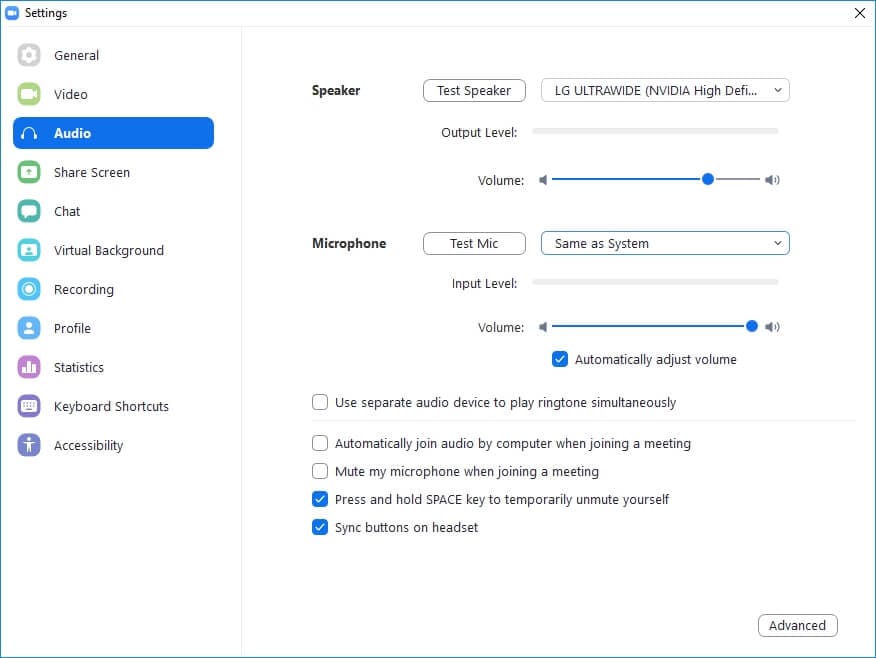
Step 3: Select and Test Microphone
Use the Microphone drop-down list to select an audio input source (typically a microphone), and click Test Mic to check if it is working fine. Use the Volume slider to adjust the input sound level manually. Alternatively, you can keep the Automatically adjust volume box checked to let Zoom automatically manage the input volume level as per the surrounding environment.
Part 2: Zoom Audio Settings During an Ongoing Meeting
As you initiate or join a Zoom meeting, the app pops up a box asking you to join the meeting with computer audio or test if the speaker and microphone are working before joining. On this box, you can also check the Automatically join audio by computer when joining a meeting box at the bottom to automatically use the computer’s sound device for audio output and input every time you host or participate in a meeting.
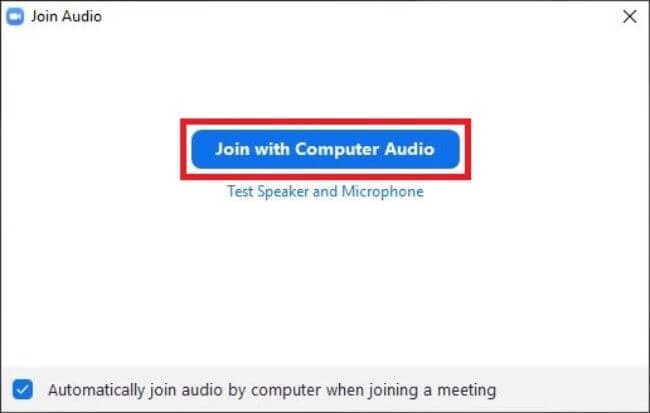
Once you are in a conference, there are a couple of things you can do to manage the audio. The process of doing so is explained below in detail:
Tip 1: Mute Audio
During an ongoing meeting, click the Microphone icon present at the bottom-left corner of the main window to disable it. Click the icon again to re-enable the mic.

Tip 2: Choose Output Device
Click the small up arrow next to the Microphone icon, and click to select your preferred output device (speakers, headsets, etc.) from the Select a Speaker section of the menu that appears.
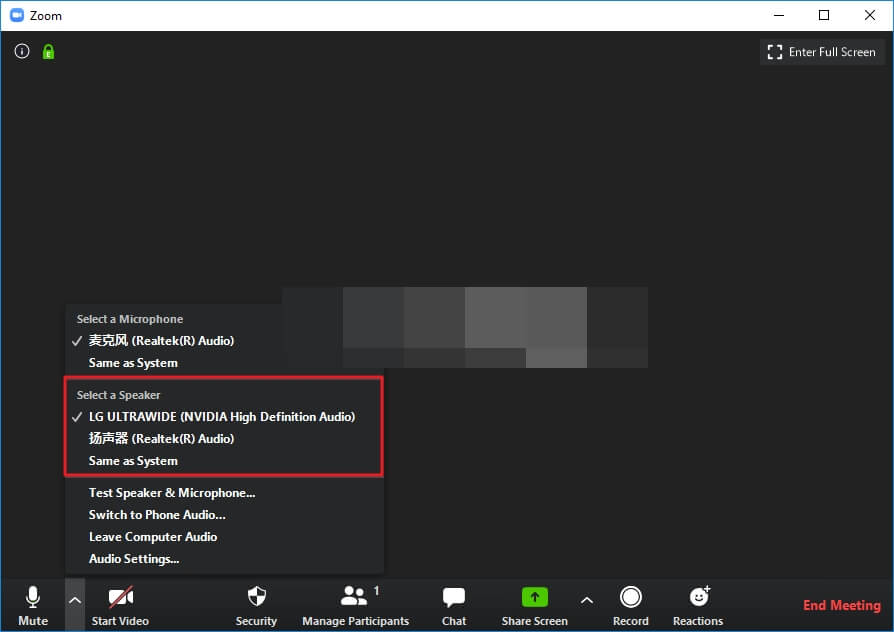
Tip 3: Choose Input Device
While on the menu as explained in Tip 2, select an input device from the Select a Microphone section.
Zoom Audio Poor Quality Troubleshooting
While you are in a Zoom meeting, you might experience some issues related to the audio. These might be due to unmanaged positioning of the hardware devices, improper configurations of the Zoom audio settings, or both. Some of the most common Zoom audio problems and their possible solutions are discussed below:
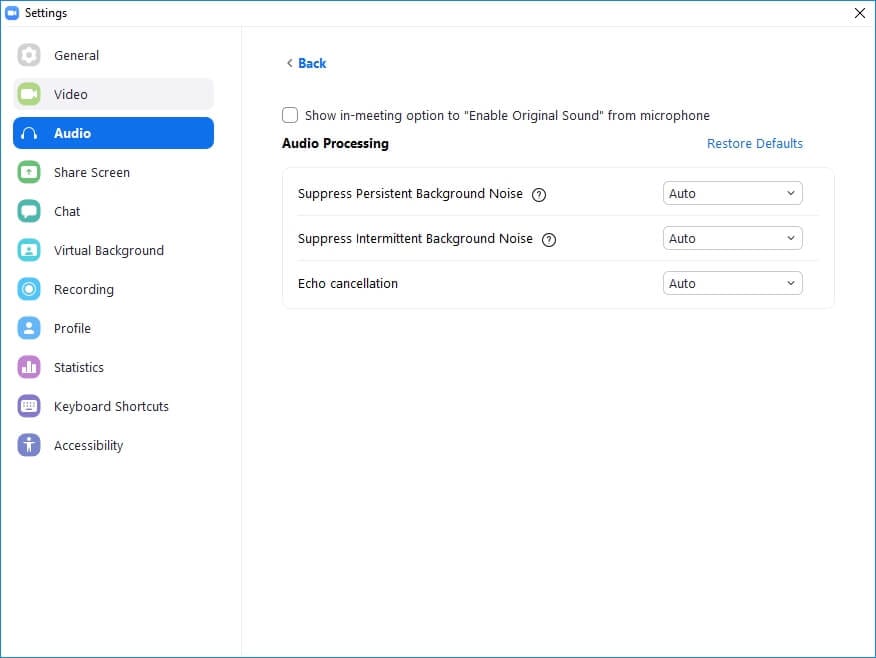
Zoom Audio Issue 1: Audio Feedback Loop
What Is It?
Audio feedback loop is when your voice keeps repeating itself for an indefinite number of times and never stops whatsoever.
Related: 6 Top Voice Changer for Zoom
How It Happens?
When you are using external speakers and microphone, and both are placed nearby, any sound that comes out of the speaker is received by the microphone. If Zoom is configured to accept sounds from system audio, the mic sends the signals back to the speakers that again send the audio output to the mic. Since this iteration never ends, you continuously hear an audio feedback loop.
How to Resolve the Audio Loop in Zoom Meeting?
In order to eliminate this issue, make sure to place both microphone and speakers at a safe distance from each other. This would prevent the microphone from receiving any output from the speakers, and the chain of audio feedback loop would never take place.
Zoom Audio Issue 2: Background Noise
What Is It?
Background noise is the distortion or humming that you hear during an audio call on zoom.
Why I hear background noise in Zoom Meeting?
If you have a highly sensitive microphone that is mostly used by professionals or in recording studios, the chances are that it will catch a lot of background noise during a Zoom meeting.
How to remove the background noise in Zoom meeting?
This issue can be resolved by either hosting or joining a meeting in a closed, soundproof room, or using a less sensitive mic. It would be best if you use a normal headset that is easily available in any local electronic shop. You can also try enabling the Automatically adjust volume option from the Microphone section of the Audio category of the Settings box as explained earlier in Step 3 of the Zoom Audio Settings When Not in Meeting section.
Zoom Audio Issue 3: Echo
What Is It?
Zoom audio echo is when you hear an echo sound during an ongoing Zoom meeting with audio enabled.
How It Happens?
Echo happens when you are on a laptop and are using onboard speakers and microphone, and that too with the speaker or mic volume set to maximum.
How to remove the echo in the Zoom meeting?
As mentioned earlier, it is always advisable to use a headset to avoid any such unwanted echo or audio feedback loop issues. In case you don’t have access to a headset, try configuring the microphone settings to automatically adjust the volume, and not putting the speaker volume to the max.
Conclusion
Configuring Zoom audio settings before hosting or joining a meeting is always a wise approach to avoid any audio inconsistencies during an ongoing conference. However, if you are already in one, you can use the methods given above to configure the microphone settings to get the audio right. You are also encouraged to use an average quality headset during a Zoom meeting to avoid any Zoom audio echo, feedback loop, or background noises.
Related: How to Improve Video Quality in Zoom Meetings?

Richard Bennett
Richard Bennett is a writer and a lover of all things video.
Follow @Richard Bennett
Richard Bennett
Mar 27, 2024• Proven solutions
Are you confused about how to configure Zoom audio settings to get the best sound quality during a meeting? If yes, here you will learn all about Zoom audio, its configuration, and the best way you can use the options to get the best out of your speakers and microphone.
Apart from this, you will also learn some of the best troubleshooting practices if the audio is acting up during an ongoing Zoom conference.
- Part 1: How to Set up Zoom Audio When Before Meeting
- Part 2: How to Set up Zoom Audio During Meeting
- Part 3: Zoom Audio Troubleshooting
How to Set Up Audio in Zoom Meeting?
A broad-spectrum is covered when talking about Zoom meeting audio settings since the meeting audio can be configured in both before/after or during a meeting. Working with Zoom audio settings in both scenarios is discussed below in detail:
Part 1: Zoom Audio Settings When Before Meeting
If you are not already in a Zoom meeting and want to configure sound settings to get the best audio experience, you can follow the process given below:
Note: A Windows 10 computer is used here to set up and configure audio settings in Zoom.
Step 1: Access Zoom Audio Settings Box
Launch Zoom, click the Settings (Gear) icon from the top-right corner and go to the Audio category from the navigation bar in the left of the Settings box that opens up next.

Step 2: Select and Test Output Device
Use the Speaker drop-down list to pick your preferred output device (e.g., speakers, headphone, etc.), and click Test Speaker to listen to the sound that Zoom plays. Use the Volume slider to adjust the output volume at a suitable level.

Step 3: Select and Test Microphone
Use the Microphone drop-down list to select an audio input source (typically a microphone), and click Test Mic to check if it is working fine. Use the Volume slider to adjust the input sound level manually. Alternatively, you can keep the Automatically adjust volume box checked to let Zoom automatically manage the input volume level as per the surrounding environment.
Part 2: Zoom Audio Settings During an Ongoing Meeting
As you initiate or join a Zoom meeting, the app pops up a box asking you to join the meeting with computer audio or test if the speaker and microphone are working before joining. On this box, you can also check the Automatically join audio by computer when joining a meeting box at the bottom to automatically use the computer’s sound device for audio output and input every time you host or participate in a meeting.

Once you are in a conference, there are a couple of things you can do to manage the audio. The process of doing so is explained below in detail:
Tip 1: Mute Audio
During an ongoing meeting, click the Microphone icon present at the bottom-left corner of the main window to disable it. Click the icon again to re-enable the mic.

Tip 2: Choose Output Device
Click the small up arrow next to the Microphone icon, and click to select your preferred output device (speakers, headsets, etc.) from the Select a Speaker section of the menu that appears.

Tip 3: Choose Input Device
While on the menu as explained in Tip 2, select an input device from the Select a Microphone section.
Zoom Audio Poor Quality Troubleshooting
While you are in a Zoom meeting, you might experience some issues related to the audio. These might be due to unmanaged positioning of the hardware devices, improper configurations of the Zoom audio settings, or both. Some of the most common Zoom audio problems and their possible solutions are discussed below:

Zoom Audio Issue 1: Audio Feedback Loop
What Is It?
Audio feedback loop is when your voice keeps repeating itself for an indefinite number of times and never stops whatsoever.
Related: 6 Top Voice Changer for Zoom
How It Happens?
When you are using external speakers and microphone, and both are placed nearby, any sound that comes out of the speaker is received by the microphone. If Zoom is configured to accept sounds from system audio, the mic sends the signals back to the speakers that again send the audio output to the mic. Since this iteration never ends, you continuously hear an audio feedback loop.
How to Resolve the Audio Loop in Zoom Meeting?
In order to eliminate this issue, make sure to place both microphone and speakers at a safe distance from each other. This would prevent the microphone from receiving any output from the speakers, and the chain of audio feedback loop would never take place.
Zoom Audio Issue 2: Background Noise
What Is It?
Background noise is the distortion or humming that you hear during an audio call on zoom.
Why I hear background noise in Zoom Meeting?
If you have a highly sensitive microphone that is mostly used by professionals or in recording studios, the chances are that it will catch a lot of background noise during a Zoom meeting.
How to remove the background noise in Zoom meeting?
This issue can be resolved by either hosting or joining a meeting in a closed, soundproof room, or using a less sensitive mic. It would be best if you use a normal headset that is easily available in any local electronic shop. You can also try enabling the Automatically adjust volume option from the Microphone section of the Audio category of the Settings box as explained earlier in Step 3 of the Zoom Audio Settings When Not in Meeting section.
Zoom Audio Issue 3: Echo
What Is It?
Zoom audio echo is when you hear an echo sound during an ongoing Zoom meeting with audio enabled.
How It Happens?
Echo happens when you are on a laptop and are using onboard speakers and microphone, and that too with the speaker or mic volume set to maximum.
How to remove the echo in the Zoom meeting?
As mentioned earlier, it is always advisable to use a headset to avoid any such unwanted echo or audio feedback loop issues. In case you don’t have access to a headset, try configuring the microphone settings to automatically adjust the volume, and not putting the speaker volume to the max.
Conclusion
Configuring Zoom audio settings before hosting or joining a meeting is always a wise approach to avoid any audio inconsistencies during an ongoing conference. However, if you are already in one, you can use the methods given above to configure the microphone settings to get the audio right. You are also encouraged to use an average quality headset during a Zoom meeting to avoid any Zoom audio echo, feedback loop, or background noises.
Related: How to Improve Video Quality in Zoom Meetings?

Richard Bennett
Richard Bennett is a writer and a lover of all things video.
Follow @Richard Bennett
Richard Bennett
Mar 27, 2024• Proven solutions
Are you confused about how to configure Zoom audio settings to get the best sound quality during a meeting? If yes, here you will learn all about Zoom audio, its configuration, and the best way you can use the options to get the best out of your speakers and microphone.
Apart from this, you will also learn some of the best troubleshooting practices if the audio is acting up during an ongoing Zoom conference.
- Part 1: How to Set up Zoom Audio When Before Meeting
- Part 2: How to Set up Zoom Audio During Meeting
- Part 3: Zoom Audio Troubleshooting
How to Set Up Audio in Zoom Meeting?
A broad-spectrum is covered when talking about Zoom meeting audio settings since the meeting audio can be configured in both before/after or during a meeting. Working with Zoom audio settings in both scenarios is discussed below in detail:
Part 1: Zoom Audio Settings When Before Meeting
If you are not already in a Zoom meeting and want to configure sound settings to get the best audio experience, you can follow the process given below:
Note: A Windows 10 computer is used here to set up and configure audio settings in Zoom.
Step 1: Access Zoom Audio Settings Box
Launch Zoom, click the Settings (Gear) icon from the top-right corner and go to the Audio category from the navigation bar in the left of the Settings box that opens up next.

Step 2: Select and Test Output Device
Use the Speaker drop-down list to pick your preferred output device (e.g., speakers, headphone, etc.), and click Test Speaker to listen to the sound that Zoom plays. Use the Volume slider to adjust the output volume at a suitable level.

Step 3: Select and Test Microphone
Use the Microphone drop-down list to select an audio input source (typically a microphone), and click Test Mic to check if it is working fine. Use the Volume slider to adjust the input sound level manually. Alternatively, you can keep the Automatically adjust volume box checked to let Zoom automatically manage the input volume level as per the surrounding environment.
Part 2: Zoom Audio Settings During an Ongoing Meeting
As you initiate or join a Zoom meeting, the app pops up a box asking you to join the meeting with computer audio or test if the speaker and microphone are working before joining. On this box, you can also check the Automatically join audio by computer when joining a meeting box at the bottom to automatically use the computer’s sound device for audio output and input every time you host or participate in a meeting.

Once you are in a conference, there are a couple of things you can do to manage the audio. The process of doing so is explained below in detail:
Tip 1: Mute Audio
During an ongoing meeting, click the Microphone icon present at the bottom-left corner of the main window to disable it. Click the icon again to re-enable the mic.

Tip 2: Choose Output Device
Click the small up arrow next to the Microphone icon, and click to select your preferred output device (speakers, headsets, etc.) from the Select a Speaker section of the menu that appears.

Tip 3: Choose Input Device
While on the menu as explained in Tip 2, select an input device from the Select a Microphone section.
Zoom Audio Poor Quality Troubleshooting
While you are in a Zoom meeting, you might experience some issues related to the audio. These might be due to unmanaged positioning of the hardware devices, improper configurations of the Zoom audio settings, or both. Some of the most common Zoom audio problems and their possible solutions are discussed below:

Zoom Audio Issue 1: Audio Feedback Loop
What Is It?
Audio feedback loop is when your voice keeps repeating itself for an indefinite number of times and never stops whatsoever.
Related: 6 Top Voice Changer for Zoom
How It Happens?
When you are using external speakers and microphone, and both are placed nearby, any sound that comes out of the speaker is received by the microphone. If Zoom is configured to accept sounds from system audio, the mic sends the signals back to the speakers that again send the audio output to the mic. Since this iteration never ends, you continuously hear an audio feedback loop.
How to Resolve the Audio Loop in Zoom Meeting?
In order to eliminate this issue, make sure to place both microphone and speakers at a safe distance from each other. This would prevent the microphone from receiving any output from the speakers, and the chain of audio feedback loop would never take place.
Zoom Audio Issue 2: Background Noise
What Is It?
Background noise is the distortion or humming that you hear during an audio call on zoom.
Why I hear background noise in Zoom Meeting?
If you have a highly sensitive microphone that is mostly used by professionals or in recording studios, the chances are that it will catch a lot of background noise during a Zoom meeting.
How to remove the background noise in Zoom meeting?
This issue can be resolved by either hosting or joining a meeting in a closed, soundproof room, or using a less sensitive mic. It would be best if you use a normal headset that is easily available in any local electronic shop. You can also try enabling the Automatically adjust volume option from the Microphone section of the Audio category of the Settings box as explained earlier in Step 3 of the Zoom Audio Settings When Not in Meeting section.
Zoom Audio Issue 3: Echo
What Is It?
Zoom audio echo is when you hear an echo sound during an ongoing Zoom meeting with audio enabled.
How It Happens?
Echo happens when you are on a laptop and are using onboard speakers and microphone, and that too with the speaker or mic volume set to maximum.
How to remove the echo in the Zoom meeting?
As mentioned earlier, it is always advisable to use a headset to avoid any such unwanted echo or audio feedback loop issues. In case you don’t have access to a headset, try configuring the microphone settings to automatically adjust the volume, and not putting the speaker volume to the max.
Conclusion
Configuring Zoom audio settings before hosting or joining a meeting is always a wise approach to avoid any audio inconsistencies during an ongoing conference. However, if you are already in one, you can use the methods given above to configure the microphone settings to get the audio right. You are also encouraged to use an average quality headset during a Zoom meeting to avoid any Zoom audio echo, feedback loop, or background noises.
Related: How to Improve Video Quality in Zoom Meetings?

Richard Bennett
Richard Bennett is a writer and a lover of all things video.
Follow @Richard Bennett
Richard Bennett
Mar 27, 2024• Proven solutions
Are you confused about how to configure Zoom audio settings to get the best sound quality during a meeting? If yes, here you will learn all about Zoom audio, its configuration, and the best way you can use the options to get the best out of your speakers and microphone.
Apart from this, you will also learn some of the best troubleshooting practices if the audio is acting up during an ongoing Zoom conference.
- Part 1: How to Set up Zoom Audio When Before Meeting
- Part 2: How to Set up Zoom Audio During Meeting
- Part 3: Zoom Audio Troubleshooting
How to Set Up Audio in Zoom Meeting?
A broad-spectrum is covered when talking about Zoom meeting audio settings since the meeting audio can be configured in both before/after or during a meeting. Working with Zoom audio settings in both scenarios is discussed below in detail:
Part 1: Zoom Audio Settings When Before Meeting
If you are not already in a Zoom meeting and want to configure sound settings to get the best audio experience, you can follow the process given below:
Note: A Windows 10 computer is used here to set up and configure audio settings in Zoom.
Step 1: Access Zoom Audio Settings Box
Launch Zoom, click the Settings (Gear) icon from the top-right corner and go to the Audio category from the navigation bar in the left of the Settings box that opens up next.

Step 2: Select and Test Output Device
Use the Speaker drop-down list to pick your preferred output device (e.g., speakers, headphone, etc.), and click Test Speaker to listen to the sound that Zoom plays. Use the Volume slider to adjust the output volume at a suitable level.

Step 3: Select and Test Microphone
Use the Microphone drop-down list to select an audio input source (typically a microphone), and click Test Mic to check if it is working fine. Use the Volume slider to adjust the input sound level manually. Alternatively, you can keep the Automatically adjust volume box checked to let Zoom automatically manage the input volume level as per the surrounding environment.
Part 2: Zoom Audio Settings During an Ongoing Meeting
As you initiate or join a Zoom meeting, the app pops up a box asking you to join the meeting with computer audio or test if the speaker and microphone are working before joining. On this box, you can also check the Automatically join audio by computer when joining a meeting box at the bottom to automatically use the computer’s sound device for audio output and input every time you host or participate in a meeting.

Once you are in a conference, there are a couple of things you can do to manage the audio. The process of doing so is explained below in detail:
Tip 1: Mute Audio
During an ongoing meeting, click the Microphone icon present at the bottom-left corner of the main window to disable it. Click the icon again to re-enable the mic.

Tip 2: Choose Output Device
Click the small up arrow next to the Microphone icon, and click to select your preferred output device (speakers, headsets, etc.) from the Select a Speaker section of the menu that appears.

Tip 3: Choose Input Device
While on the menu as explained in Tip 2, select an input device from the Select a Microphone section.
Zoom Audio Poor Quality Troubleshooting
While you are in a Zoom meeting, you might experience some issues related to the audio. These might be due to unmanaged positioning of the hardware devices, improper configurations of the Zoom audio settings, or both. Some of the most common Zoom audio problems and their possible solutions are discussed below:

Zoom Audio Issue 1: Audio Feedback Loop
What Is It?
Audio feedback loop is when your voice keeps repeating itself for an indefinite number of times and never stops whatsoever.
Related: 6 Top Voice Changer for Zoom
How It Happens?
When you are using external speakers and microphone, and both are placed nearby, any sound that comes out of the speaker is received by the microphone. If Zoom is configured to accept sounds from system audio, the mic sends the signals back to the speakers that again send the audio output to the mic. Since this iteration never ends, you continuously hear an audio feedback loop.
How to Resolve the Audio Loop in Zoom Meeting?
In order to eliminate this issue, make sure to place both microphone and speakers at a safe distance from each other. This would prevent the microphone from receiving any output from the speakers, and the chain of audio feedback loop would never take place.
Zoom Audio Issue 2: Background Noise
What Is It?
Background noise is the distortion or humming that you hear during an audio call on zoom.
Why I hear background noise in Zoom Meeting?
If you have a highly sensitive microphone that is mostly used by professionals or in recording studios, the chances are that it will catch a lot of background noise during a Zoom meeting.
How to remove the background noise in Zoom meeting?
This issue can be resolved by either hosting or joining a meeting in a closed, soundproof room, or using a less sensitive mic. It would be best if you use a normal headset that is easily available in any local electronic shop. You can also try enabling the Automatically adjust volume option from the Microphone section of the Audio category of the Settings box as explained earlier in Step 3 of the Zoom Audio Settings When Not in Meeting section.
Zoom Audio Issue 3: Echo
What Is It?
Zoom audio echo is when you hear an echo sound during an ongoing Zoom meeting with audio enabled.
How It Happens?
Echo happens when you are on a laptop and are using onboard speakers and microphone, and that too with the speaker or mic volume set to maximum.
How to remove the echo in the Zoom meeting?
As mentioned earlier, it is always advisable to use a headset to avoid any such unwanted echo or audio feedback loop issues. In case you don’t have access to a headset, try configuring the microphone settings to automatically adjust the volume, and not putting the speaker volume to the max.
Conclusion
Configuring Zoom audio settings before hosting or joining a meeting is always a wise approach to avoid any audio inconsistencies during an ongoing conference. However, if you are already in one, you can use the methods given above to configure the microphone settings to get the audio right. You are also encouraged to use an average quality headset during a Zoom meeting to avoid any Zoom audio echo, feedback loop, or background noises.
Related: How to Improve Video Quality in Zoom Meetings?

Richard Bennett
Richard Bennett is a writer and a lover of all things video.
Follow @Richard Bennett
Also read:
- [Updated] 2024 Approved The Great Video Conduit Debate OBS Versus Twitch Studio
- [Updated] Essential Do's and Don'ts for Twilight Self-Portraiture
- [Updated] Recording Realities – Evaluating the Power and Precision of Apeaksoftware
- [Updated] Speedy Shots Masterful iPhone Time Lapse Methods for 2024
- 6 Ways to Change Spotify Location On Your Vivo V27e | Dr.fone
- Convert Your MTS Videos to MP4 with These Quick Tips for Windows 11/Mac Users
- In 2024, AZ Record App Deep Dive & Alternatives Guide
- In 2024, FlashCapture Screen Tools
- In 2024, Pro-Level Screenshot Techniques with Top 11 Tools
- In 2024, Video Editing Mastery Top 4K/8K Software for Beginners and Pros
- New In 2024, In This Article, I Will Share Top 40 Keyboard Shortcuts for Final Cut Pro and Ive Categorized Them to Make These Easier to Find
- The Easy Path to Engaging Animation in Your Videos
- Title: Zoom's Auditory Masterclass Fine-Tuning for Impeccable Audio for 2024
- Author: Queen
- Created at : 2025-02-05 02:59:33
- Updated at : 2025-02-07 22:54:10
- Link: https://screen-mirroring-recording.techidaily.com/zooms-auditory-masterclass-fine-tuning-for-impeccable-audio-for-2024/
- License: This work is licensed under CC BY-NC-SA 4.0.